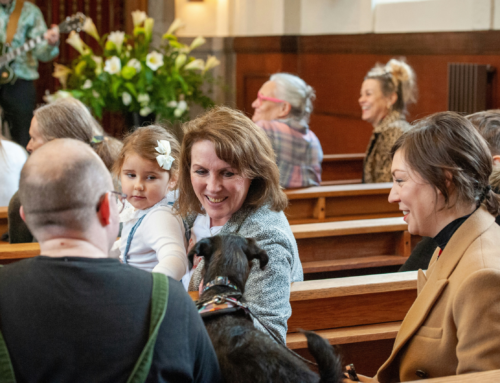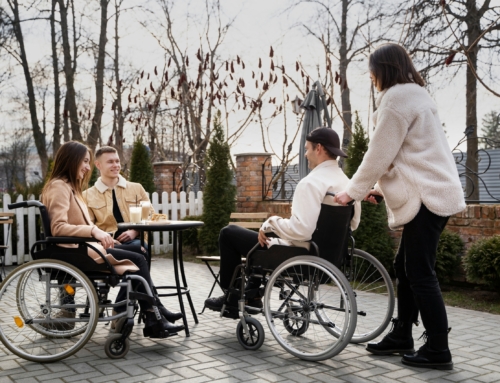In today’s guest post Sarah Smith reflects on her life with disability and shares her impressions from the Tyndale course Disability, Theology, and the Church.
Recently I embarked on a journey into the realm of disability and the church through a partnership course between Christian Horizons and Tyndale University, “Disability, Theology, and the Church: Everybody Belongs,” facilitated by Dr. Neil Cudney and Chantal Huinink. I found that this course resonated with me in a way my prior education in disability studies had not.
Reflections on my personal life
I grew up in a Christian home so we talked a lot about God, Jesus, salvation, the Bible, etc. I became a Christian at a young age, but my journey had just begun. I always felt a pull to people with disabilities whether adults or other children, reading the stories of Joni Erikson-Tada and Helen Keller many times as a child. Yet I kept feeling this desire to be more involved. In reflection, I see it was a desire to be with others “like me”… fast-forward a decade or two and a bunch of education and I am now working as a Direct Support Professional with Christian Horizons.
As someone who cares for others on a very personal level, I understand why I pass as “temporarily able-bodied”, yet what others fail to recognize is just how temporary that is for me. Although there is nothing physically wrong with my muscles or joints and I am able to perform well on standardized IQ testing (albeit flawed, but we’ll save that for another discussion), I too am impacted daily by various exceptionalities. There are days that despite the aforementioned factors, I am significantly impaired in my Activities of Daily Living. For this reason, even the recently embraced “temporarily able-bodied” label is problematic for those with invisible disabilities who may be struggling immensely to get out the door in the morning and are misunderstood by their communities because they look “normal”.
During this course we examined how particular passages in the Bible may disenfranchise those grappling with a diagnosis. When asked to discuss a disability-related passage, “Who made man’s mouth?” (a partial quote from Exodus 4:10) is the first that came to mind for me. Having grown up watching “Prince of Egypt”, I wasn’t fully aware of the extent to which Moses was afraid to speak to Pharoah. This was both because I was diagnosed in adulthood so often didn’t understand why I functioned the way I do- thus had never considered the relatability personally and because I hadn’t actually read the Exodus account. Honestly, I always saw hope in these verses because it told me that whatever struggle I was experiencing, God made me. Other verses confirm that he knit us together (Psalm 139:13) and has plans for us to accomplish great things (Jeremiah 29:11). I was surprised to learn that others have not always garnered the same support from these verses. It was good to be reminded that “God doesn’t make mistakes,” despite the medical community’s spin.
Feel free to read on for a few of my reflections upon taking the course, if you wish!

Reflections on Tyndale course
- I personally experienced accessibility barriers trying to find the accessibility office as well as getting the texts in a format I can benefit from. What does this say to the disability community about belonging in post-secondary institutions? (this has been my typical experience, not an experience just with this course). We have a lot of work to do not only in the church but also in educational settings.
- Throughout our time together we discussed past, present, and future approaches to disability through societal and biblical lenses. Most of the frameworks I was aware of, but I had not considered the role of both the local church and the faith community as a whole. The way Christians discuss and support those experiencing disabilities appears to be more influenced by the dominant culture than it is a vehicle for change (at least in the “minority world”- as one speaker referred to it). This is troubling because Jesus challenges us to take the gospel to all, yet though over a billion people experience a disabling condition at some point in their lives (whether temporary or permanent), those with disabilities remain the largest unreached people group WORLDWIDE.
- Terminology ebbs and flows with culture so words which were once viewed as scientific now carry stigmas due to the treatments that accompanied them. Some such terms include the “r” word, “idiot,” “imbecile,” and “moron” which have entered the vernacular as common insults. While one may think that with the “spread the word to end the word” campaign our society has made progress, terms are constantly being replaced. New terms include acronyms like EGR (extra grace required) which are equally pejorative.
- We had good discussion around whether to use person-first language or not. Some people feel their disability is an important part of their identity, and so prefer “identity-first” language. It seems best to follow a person-centred approach, allowing each person to choose their preferred way of describing themselves.
- One quote which stuck out to me this week was from John Swinton “to be included you are present, to belong, you are missed.” Chantal, who uses a wheelchair, relayed a story about being included on a youth event and how impactful it was for her to be meaningfully included with her peers. This reminds me of a retreat I helped at where the participants were presented an opportunity to go tubing. Some of the individuals were non-ambulatory and many of their families were floored by the notion that we would approach them for permission to facilitate THEIR child’s participation too. I’m not sure whether the children (most were under 18) or the parents enjoyed it more – all had a great time.
- Another interesting topic we explored was the concept of “pity” vs. “compassion”. The presenter explained that pity is the discomfort we feel when confronted with the idea that someone else may be worse off than I, whereas compassion is when we come alongside that person and share their experiences. When you spend time with someone affected by disability, what is your motivation?
- In keeping with this concept of pity, and the role of the church, it was also discussed that it is important to move as a church from exclusion to service with the more marginalized members of the body of Christ. Although it is good to minister to people and families affected by disabilities, the body of Christ is not complete without the gifts each of these members possess when equipped to serve.
- I enjoyed the discussion on ethics and bioethics involved with people with disabilities. These were complex discussions around the role of MAiD (Canada’s Medical Assistance in Dying legislation), genetic testing and abortion when disability is present, perceptions on quality of life, COVID response and triaging, and the role of the church in these bioethical questions. Christians may have preconceived ideas as to what they think about each issue, but when it hits home, do their actions match their beliefs?
- Our world tells those with disabilities we are better off dead than disabled because we are a burden on others and don’t have “quality of life.” I challenge this as society needs, instead, to change to better support us. In a poem shared by forum writer Chantal Huinink she asks, “Should He make me like you, is that the best God can do?” This line resonates with me. We discussed the importance of gifts and the true meaning of the Body of Christ – we are actually impaired without the gifts and talents that every person brings.
- An additional conversation that came up often was on healing vs. curing. While healing is restoring relationships and can mean different things for different people, “curing” is only temporary alleviation of impairment similar to trying to “fix” someone. In one work “Everybody Belongs”, Neil Cudney analyses team-selection in gym class, which resonates personally as I have often been overlooked as being a burden rather than an asset because of my disabilities, despite having several ways I could contribute. Neil also challenges us to “pick up our corner” of the mat. This is encouraging because alone none of those 5 friends would be successful in getting to Jesus, but together they could accomplish their goal. (Matt. 9:1-8) As someone who holds passing privilege, I am challenged to advocate well for others, to ensure it is their voices which are being heard, not just mine. In practice, it is much easier to change a structure than it is to change hearts.



